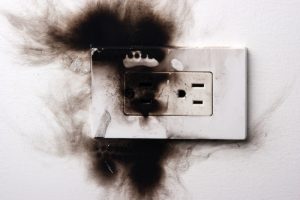 If your home experiences even a partial blackout, but none of your neighbors experience the same thing, then it’s pretty clear you have an electrical problem, right? You’d know to call in a professional electrician and get it fixed as soon as possible. After all, you wouldn’t be able to enjoy any of the modern conveniences of everyday life without electricity!
If your home experiences even a partial blackout, but none of your neighbors experience the same thing, then it’s pretty clear you have an electrical problem, right? You’d know to call in a professional electrician and get it fixed as soon as possible. After all, you wouldn’t be able to enjoy any of the modern conveniences of everyday life without electricity!
Of course, when signs are more subtle—flickering lights every now and then, a constantly tripping circuit breaker—you may be more tempted to just “let it be” for now and keep on living your life. Unfortunately, this can lead not only to inconveniences but actual safety hazards too. Read on as we uncover the signs you have electrical problems, and why they matter.
You Have a Breaker That Keeps Tripping
Your home’s circuit breaker panel is designed to keep you safe. The way it does this is by cutting off the flow of electricity if it starts to act in a manner it shouldn’t. If you have a circuit breaker or a series of breakers that keep tripping, you may just figure, “eh, it’s doing its job” and go reset it.
The problem with this attitude is that you need to get behind the reason this keeps happening. There is likely a short circuit somewhere in the system, and while your breakers are doing their job to keep you safe, there is a limit. The last thing you need is an electrical fire that could have been prevented.
Flickering Lights
Sure, it’s fun to joke about how it’s a sign your home is haunted, but this is likely not the case. Now, if you just have one light fixture that seems to be struggling, it may be a problem with that particular fixture or it could be there are too many electrical components connected to its circuit breaker. Try plugging it into another outlet to see if that helps!
If, however, the flickering lights are widespread throughout a section of your home or even your entire home, you’re probably looking at an electrical system that needs an upgrade. Give us a call if you suspect this to be the case!
Hot Spots on Walls
When a short circuit directs electrical energy into the area surrounding the wire, it redirects that energy as heat. So if you notice that the area surrounding an outlet or a wall switch is warm—or really anywhere on your walls is warm—then that’s probably what’s happening.
Keep in mind, however, dimmer switches are an exception. They’re naturally warm to the touch in many cases, whereas your average wall switch won’t have this occur. If your dimmer switch is hot to the touch, then yes you should have it inspected by a pro. But if it’s warmer when you have the lights turned up as far as they’ll go, that’s to be expected to a point.
To get in touch with expert electricians in Eugene, OR look no further than Comfort Flow Heating. Contact us today!

